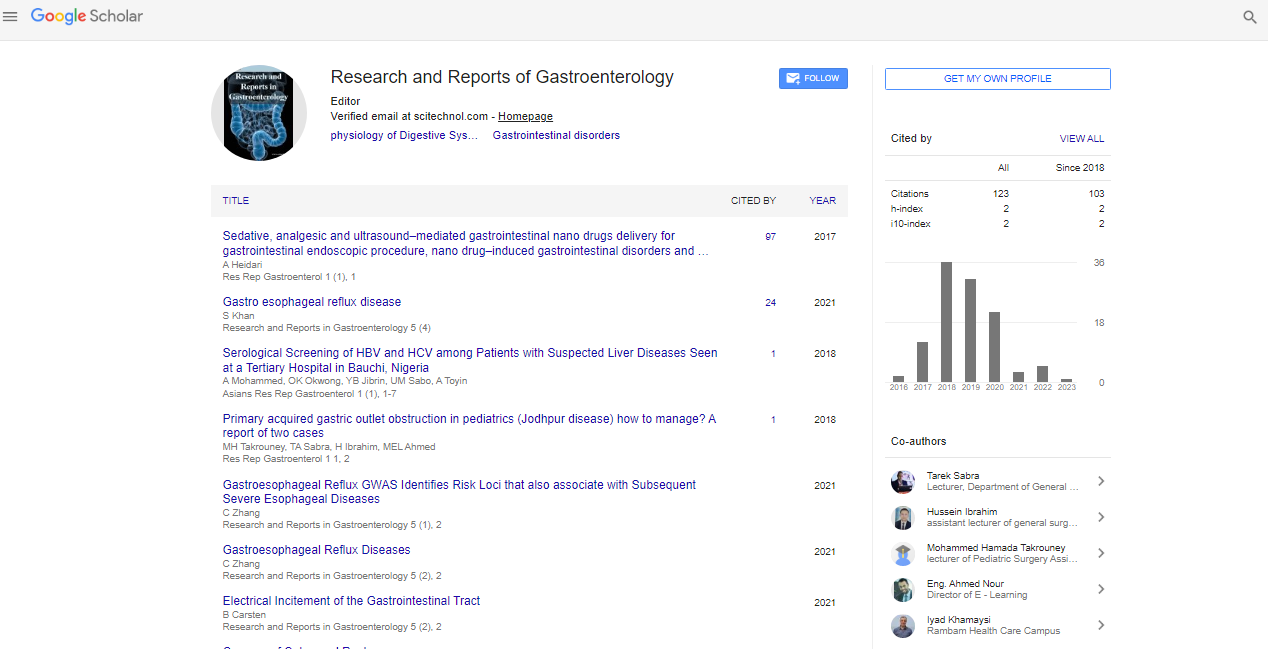Commentary, Res Rep Gastroenterol Vol: 7 Issue: 1
Oral Disease and Are Modulated By Intestinal Microbiome
Mariana Helis*
Department of Gastroenterology, Post Graduate Institute of Medical Education and Research, Chandigarh, India
*Corresponding author: Mariana Helis
Department of Gastroenterology, Post Graduate Institute of Medical Education and Research, Chandigarh, India
Email: helis_l@gmail.com
Received date: 20 February, 2023, Manuscript No. RRG-23-97817;
Editor assigned date: 22 February, 2023, PreQC No. RRG-23-97817 (PQ);
Reviewed date: 08 March, 2023, QC No. RRG-23-97817;
Revised date: 15 March, 2023, Manuscript No. RRG-23-97817 (R);
Published date: 23 March, 2023, DOI: 10.4172/Rrg.1000129
Citation: Helis M (2023) Oral Disease and Are Modulated By Intestinal Microbiome. Res Rep Gastroenterol 7:1.
Description
Oral diseases are a significant public health issue affecting millions of people worldwide. These diseases include dental caries (tooth decay), periodontitis (gum disease), and oral cancer. While genetics, environmental factors, and lifestyle behaviors contribute to oral disease development, emerging research suggests that the intestinal microbiome plays a vital role in modulating oral disease risk.
The intestinal microbiome refers to the trillions of microorganisms residing in the human gut. These microorganisms, including bacteria, viruses, and fungi, play essential roles in maintaining overall health and wellness, including the regulation of immune function and metabolism. Recent studies have also revealed that the intestinal microbiome influences the development and progression of oral disease.
One mechanism by which the intestinal microbiome modulates oral disease risk is through the regulation of immune function. Studies have shown that the gut microbiota plays a critical role in training and educating the immune system to recognize and respond appropriately to pathogens. Imbalances in the gut microbiome, such as dysbiosis, can lead to immune dysfunction, which may increase the risk of oral disease. For example, a study conducted in 2018 found that individuals with periodontitis had a less diverse gut microbiome and a higher abundance of pro-inflammatory bacteria compared to healthy individuals. These findings suggest that an imbalanced gut microbiome may promote a pro-inflammatory state, leading to an increased risk of periodontitis.
Another mechanism by which the intestinal microbiome modulates oral disease risk is through the production of metabolites. The gut microbiome produces a vast array of metabolites that can impact host physiology, including the oral cavity. One class of metabolites, Short-Chain Fatty Acids (SCFAs), has been shown to have anti-inflammatory properties and may protect against oral disease. For example, a study conducted in 2019 found that individuals with higher levels of SCFAs had a lower risk of developing periodontitis. These findings suggest that the gut microbiome may produce metabolites that protect against oral disease.
Furthermore, emerging research suggests that the oral microbiome and the gut microbiome are interconnected and may influence each other's composition and function. The oral microbiome refers to the microorganisms residing in the oral cavity, including the teeth, tongue, and gums. Like the gut microbiome, the oral microbiome plays a crucial role in maintaining oral health and preventing disease. Recent studies have revealed that changes in the gut microbiome may impact the composition and function of the oral microbiome, and vice versa. For example, a study conducted in 2020 found that altering the gut microbiome in mice resulted in changes in the oral microbiome, leading to an increased risk of oral disease. These findings suggest that the gut microbiome may influence oral disease risk through its effects on the oral microbiome.
While the role of the intestinal microbiome in modulating oral disease risk is becoming increasingly clear, much research is still needed to fully understand the mechanisms involved. Furthermore, while the findings are promising, more research is needed to determine the clinical implications of these findings. However, these findings do suggest that interventions aimed at improving gut health, such as dietary modifications or probiotic supplementation, may hold promise as a novel approach to preventing and treating oral disease.
In conclusion, oral diseases are a significant public health issue that affects millions of people worldwide. Emerging research suggests that the intestinal microbiome plays a vital role in modulating oral disease risk. Imbalances in the gut microbiome may lead to immune dysfunction, pro-inflammatory states, and an increased risk of oral disease. The gut microbiome also produces metabolites that can protect against oral disease. Furthermore, the oral microbiome and the gut microbiome are interconnected and may influence each other's composition and function.
 Spanish
Spanish  Chinese
Chinese  Russian
Russian  German
German  French
French  Japanese
Japanese  Portuguese
Portuguese  Hindi
Hindi 